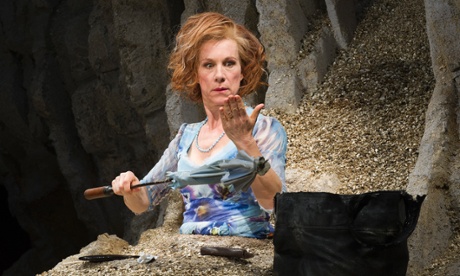
There’s a reverence towards Samuel Beckett which can sometimes be restrictive in the exploration of his work. We have had him on something of a pedestal: it’s as though, with time, he’s achieved a status slightly beyond the human. I think it’s partly because he directed the plays himself, so he has a sort of dual legacy. But not many writers are brilliant at directing their own work, and from what I have read Beckett discouraged any psychological investigation of the play in his rehearsal room.
He was very preoccupied with rhythm (the story of him putting down a metronome in front of Brenda Bruce in the Royal Court production of Happy Days is well known) but as music really, as sound. The rhythms and cadences of his text are exquisite, the nearest thing to a score I have come across – and in those rhythms lie much of the play’s meaning, because they map out the character’s unconscious self, in minute detail. But at the same time, you must not merely deliver sound. The challenge – gloriously – is to observe the shape and metre of his writing and allow that to take you deep down into the interior life of the character, into the patterns of her breath, of her thought. The rhythm and the psychology are one.
I didn’t really connect to Beckett at all until I did Not I and Footfalls with Katie Mitchell at the RSC in 1997. When she called me up about the plays I wasn’t at first very keen. I’d seen a few Beckett productions that seemed to be all about style and form over content. I said yes to Katie purely because I wanted to work with her. And she’d never done Beckett either, so we went on a sort of adventure together.
And then I fell in love with him, once I got inside the material.
Happy Days, directed by Natalie Abrahami, was the obvious progression from those two pieces. In Footfalls there are two characters – May and her mother – but only May is actually on stage. In Happy Days there is a second character, Willie, but he only occasionally appears on stage – and is very spasmodically heard. His is a lurking presence that seems to come on and off the radar. But nevertheless, the whole play really is a dualogue between Winnie and Willie. I can’t think of another relationship quite like theirs. Whether or not she can see or hear Willie, Winnie is constantly seeking his presence, neurotically checking that he is there. And having the wonderful David Beames there as Willie was also hugely reassuring for me. So when Willie speaks, albeit rarely and begrudgingly, that makes a happy day both for Winnie and the actor playing her.
Playing Winnie caused a lot of physical pain, especially in the neck and the shoulders. In our staging, the earth in which she’s buried was sculpted around me like a ballgown. Even though much of my body was hidden, this was the most physical role I’ve ever had. Winnie is a “glass half-full” type of person and I felt she would make the very most of whatever body was left to her to move – in Act I, her top half only – and keep it animated, expressive of her desire to be as optimistic as possible, to cling on to whatever elegance and dignity her demeaning and absurd imprisonment afford her. You can’t slump in the part – either physically or in the language. She is a kind of dancer.
Act II, with everything paralysed below the neck, is pretty uncomfortable. Trying to keep tension out of the hidden buried body is very hard – the subterraneous life of her body is having always to be contained and channelled through the extreme restriction of a head and neck alone. Quite a challenge for a jitter bug like me.
My understanding of Winnie changed hugely over the course of the run. We went into shooting the short film, Mayday, a week after we finished at the Young Vic, and so we brought all of our experience of Happy Days’ theatrical life to the filming. The film really asks how the character’s isolated, trapped but indomitable spirit speaks to our own time.
Natalie and I have kept in regular conversation about the play. We have what we call “Beckett in the bottom oven” meetings, partly to keep the lines in my head, and also to keep the world of the play a little warm until we stage it again in February 2015. It’s been really interesting how many thoughts and ideas continue to emerge even while on a very back burner – perhaps because of that, who knows? I feel I’ve had Winnie’s shadow beside me all year – and I can’t wait to play her again.
• Up to our necks in Beckett: Natalie Abrahami on making Mayday

